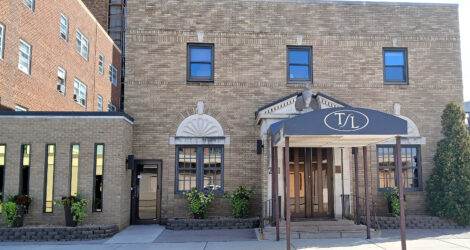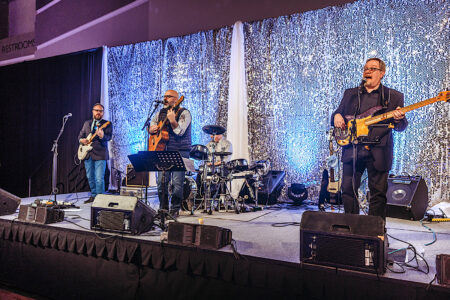Thompson-Larson Funeral Home marks 90 years of service in Minot
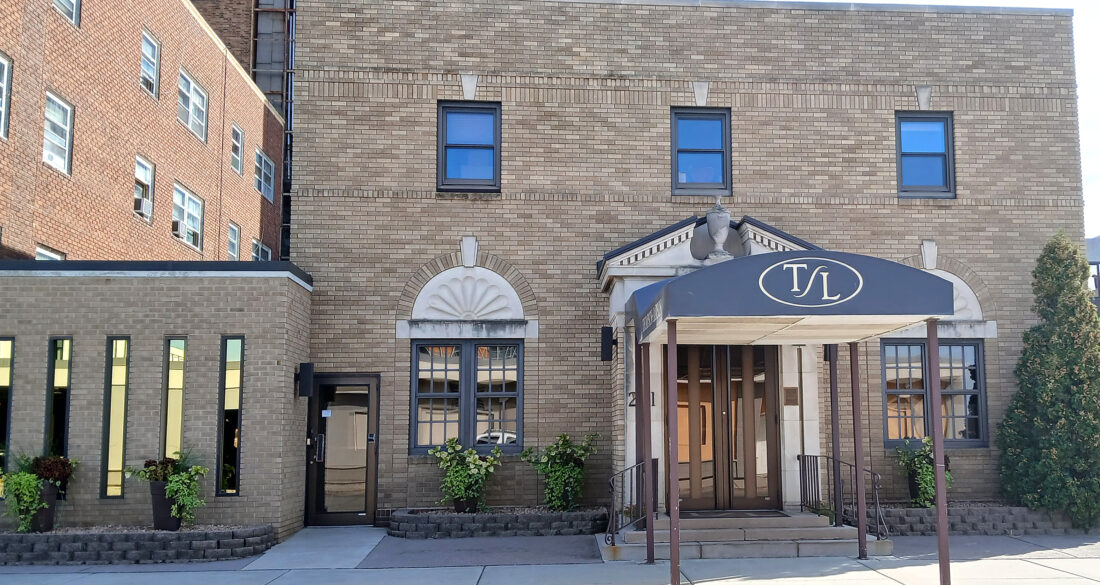
Wendy Harper/MDN Thompson-Larson Funeral Home, built in 1934, still stands today in downtown Minot.
Ninety years ago, a young man’s wedding gift to his bride planted the roots of a business that has become one of Minot’s most enduring institutions.
In 1934, Theodore Thompson built Thompson-Larson Funeral Home as a gift to his wife, Julia Larson, who made history as North Dakota’s first female licensed funeral director.
“It just goes to show that the Julia Larsons and the Ted Thompsons of the world who started and had this vision of beginning the funeral home in Minot, to now see it carry through after 90 years, is pretty terrific,” said current co-owner Ben Slind.
The funeral home passed to Edward and Catherine Fisher in 1945. The couple lived above the business and raised their family while serving the Minot community. Their son, Tom, returned after school to join the firm, continuing the family tradition.
By the 1970s and 1980s, the ownership team expanded with the addition of licensed funeral directors Engen Eckmann and Wes Burkart, along with business manager Bruce Kramer. Together, they guided the funeral home through decades of service.
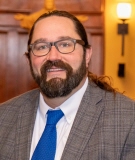
Kelly Sorenson
Slind and Kelly Sorensen joined the staff as funeral directors in 2004. In 2017, they became co-owners alongside Burkart and Kramer. Both longtime partners retired in recent years, leaving Slind and Sorensen to carry the business into its next chapter.
Through every transition, one principle has held steady: the business has never left local hands.
“That’s one of the things I’m most proud of- Thompson-Larson has always remained locally owned,” Slind said. “Somebody living in Minot has always owned it. It’s never been bought by a corporation. That says something.”
When Slind first entered funeral service 26 years ago, cremation was rare.
“I would say it was probably 10 percent cremation and 90 percent traditional funerals,” he said. “Now, we’ve gone over the 50 percent mark. COVID ramped up the cremation rate, and today some families choose cremation without services. But we still see a lot of tradition here in Minot and the surrounding communities.”
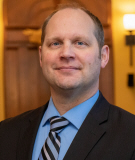
Ben Slind
The industry has shifted in other ways, too. Once, funerals followed a set pattern: certain hymns, standard memorial folders and traditional services held in churches. Now, families choose from a wider array of options, from personalized memorial folders to gatherings in less traditional venues.
“Today, there’s just a wealth of choices,” Slind said. “There’s no one cookie-cutter way of doing a funeral anymore. A lot of families call it a celebration of life service or a memorial gathering. The point is still to honor their loved one, but it looks different for each family.”
Technology also has transformed the profession. During the pandemic, livestreaming funerals became a necessity. Today, it is standard practice.
“I’d say 90 percent of services are livestreamed or recorded now,” Slind said. “Technology has actually helped us. Sometimes families can’t travel but, at least, they have the option to watch online.”
Even small details, such as memorial folders, have grown more sophisticated.
“They’re not just the basic folders anymore,” Slind said. “We can create something very personal to reflect the individual. It makes the service that much more meaningful.”
For Slind, the work is more than a profession. It is a calling rooted in community and care.
“Our motto is ‘Caring Friends, Caring for Families,'” he said. “We may not be family-owned, but we are Minot residents who were born and raised here. Families call and ask for Kelly or ask for me because of those connections. We take pride in caring for people who trust in us.”
Some of the most meaningful services Slind has directed have been for his own loved ones. He has buried three grandparents, close friends and even his sister’s infant son, Owen.
“That was the hardest thing I’ve gone through — being both a brother and the funeral director,” he said. “But it showed me just how important this work is.”
The relationships formed through funeral service often extend beyond the chapel.
“I’ve met people I never would have met otherwise,” Slind said. “Some families have become lifelong friends. I even have a couple of elderly women who jokingly adopted me as their son. That’s the kind of impact this job can have.”
The funeral home’s relationship with Minot extends far beyond its walls. Slind and his staff support local schools, civic groups and nonprofits.
“Minot State was so good to me when I was a student, so I give back there,” he said. “We sponsor youth athletics, support Alzheimer’s and cancer associations and help with community events. It’s important to us to be involved.”
The staff also works to accommodate the area’s growing cultural and religious diversity.
“We try to help families with whatever denomination or tradition they belong to, whether Catholic, Lutheran, Baptist, Jewish or Buddhist,” Slind said. “We want to honor their loved one in the way that matters most to them.”
Slind acknowledges challenges ahead, particularly in maintaining a strong pipeline of funeral directors. While more women are entering the profession — a shift that echoes the pioneering career of Julia Larson — North Dakota continues to face recruitment struggles.
“One of the interesting shifts is that the majority of mortuary school students now are female,” Slind said. “That’s a big change from when I went to school. But it’s still tough to find people willing to come to North Dakota.”
Even with those hurdles, Slind said his vision is straightforward. He wants to provide families with the very best.
“Families entrust us with their loved one’s care, and they deserve excellence,” he said. “My philosophy has always been to treat people the way I’d want to be treated. That’s what guides us.”
As Thompson-Larson marks its 90th year, Slind said the milestone is a reminder of the legacy built by those who came before and the responsibility carried by those who serve today.
“It speaks to the owners, but just as importantly to the staff who’ve worked here over the years,” he said. “The staff has meant so much to the community of Minot. You see businesses come and go, but for us to still be here after 90 years — that’s fantastic.”
For Slind, the meaning of the work hasn’t changed.
“This is one of the most unique occupations there is,” he said. “We have the chance to make a real difference for families at one of the hardest times of their lives. That’s why I still love what I do.”
- Wendy Harper/MDN Thompson-Larson Funeral Home, built in 1934, still stands today in downtown Minot.
- Kelly Sorenson
- Ben Slind

